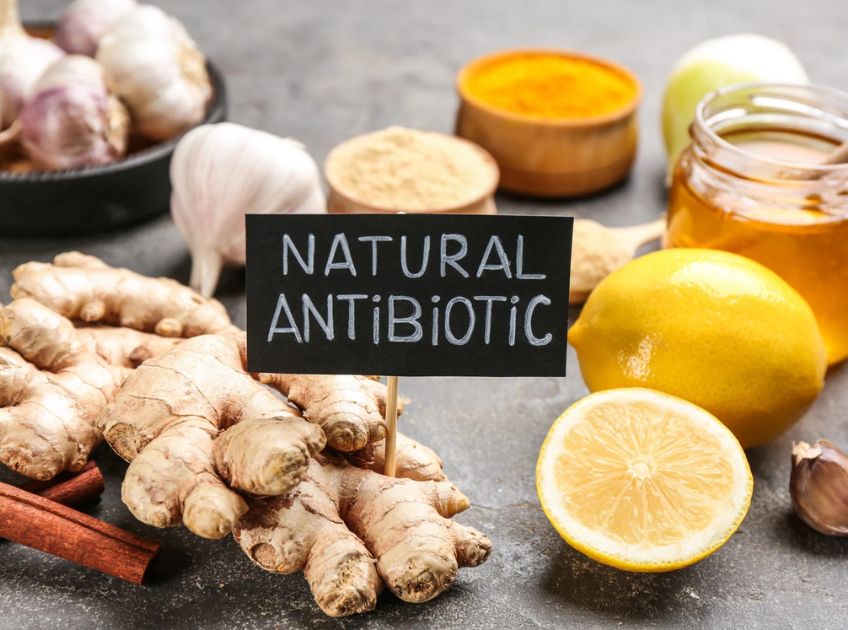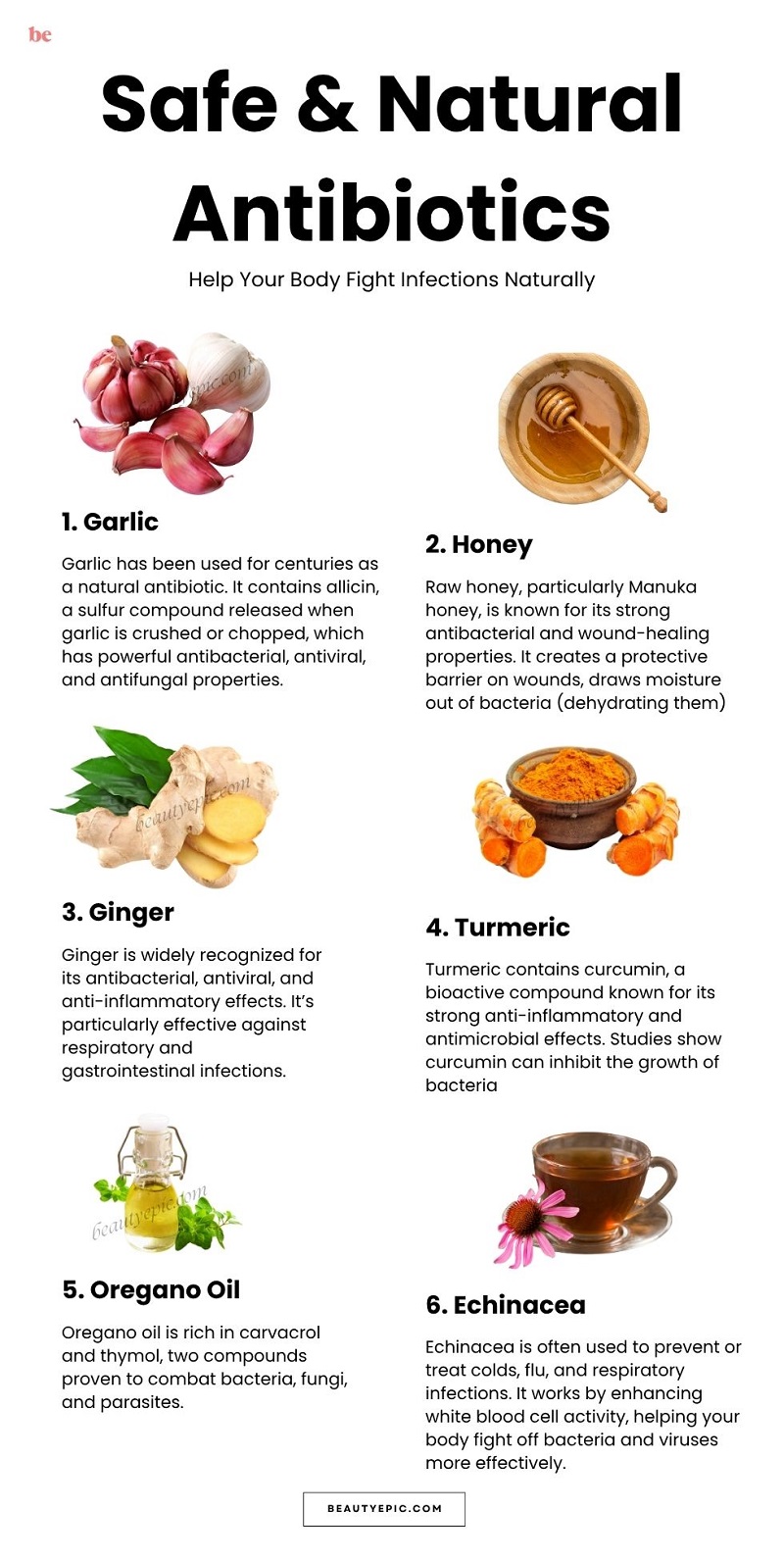
Important: This article is for informational purposes only. Please read our full disclaimer for more details.
In today’s world, antibiotics are often the first line of defense against infections. While modern medicine has saved countless lives, overuse and misuse of antibiotics have led to a global rise in antibiotic resistance—a serious health concern recognized by the World Health Organization (WHO).
Fortunately, nature offers powerful alternatives that can help prevent and combat infections safely. Many natural ingredients—found in your kitchen or garden—have proven antibacterial, antifungal, and antiviral properties. These natural antibiotics support your immune system and help your body heal without disrupting your gut flora or causing unwanted side effects.
What Do Antibiotics Do?
Antibiotics are substances that either kill bacteria or stop them from multiplying. Conventional antibiotics target specific bacterial functions, such as cell wall formation or protein synthesis. However, synthetic antibiotics can also harm beneficial bacteria, leading to gut imbalances and reduced immunity.
Natural antibiotics, on the other hand, often work more gently and broadly. They strengthen your immune defenses, reduce inflammation, and fight a range of harmful pathogens while preserving your body’s natural microbiome. Research continues to uncover how certain herbs, spices, and plant compounds can perform these functions effectively—sometimes even matching the potency of pharmaceuticals.
6 Safe and Natural Antibiotics
1. Garlic – Nature’s Most Potent Antimicrobial
Garlic has been used for centuries as a natural antibiotic. It contains allicin, a sulfur compound released when garlic is crushed or chopped, which has powerful antibacterial, antiviral, and antifungal properties.
Research published in the Journal of Antimicrobial Chemotherapy found that allicin can inhibit the growth of common bacteria such as E. coli and Staphylococcus aureus (1).
How to use: Crush a fresh garlic clove and mix it with honey or olive oil. Consume daily, especially during cold or flu season.
2. Honey – The Sweet Healer
Raw honey, particularly Manuka honey, is known for its strong antibacterial and wound-healing properties. It creates a protective barrier on wounds, draws moisture out of bacteria (dehydrating them), and contains natural hydrogen peroxide that helps disinfect.
A Frontiers in Microbiology study demonstrated that Manuka honey effectively inhibits multiple antibiotic-resistant bacteria, including MRSA (2).
How to use: Apply raw honey to minor wounds, burns, or acne spots. For internal infections, stir one teaspoon of Manuka honey into warm tea or water daily.
3. Ginger – The Anti-Inflammatory Powerhouse
Ginger is widely recognized for its antibacterial, antiviral, and anti-inflammatory effects. It’s particularly effective against respiratory and gastrointestinal infections.
A study in the International Journal of Molecular Sciences found that ginger extract inhibits the growth of several harmful microbes, including Salmonella and E. coli (3).
How to use: Brew fresh ginger tea with lemon and honey, or add grated ginger to meals and smoothies for daily immune support.
4. Turmeric – The Golden Antibiotic
Turmeric contains curcumin, a bioactive compound known for its strong anti-inflammatory and antimicrobial effects. Studies show curcumin can inhibit the growth of bacteria like Helicobacter pylori, which causes stomach ulcers, and fungi such as Candida albicans.
Research from the Journal of Applied Microbiology found that combining curcumin with piperine (from black pepper) enhances its absorption and antibacterial potency (4).
How to use: Mix turmeric powder with warm milk (golden milk) or take it as a supplement paired with black pepper for better absorption.
5. Oregano Oil – A Potent Natural Antibiotic
Oregano oil is rich in carvacrol and thymol, two compounds proven to combat bacteria, fungi, and parasites. It’s so powerful that some studies compare its antibacterial effects to those of traditional antibiotics.
A 2018 study published in Frontiers in Microbiology showed that oregano oil effectively disrupted biofilms—protective layers that make bacteria resistant to antibiotics (5).
How to use: Mix a few drops of oregano essential oil (diluted with coconut or olive oil) and take it under professional supervision. Avoid undiluted use, as it can irritate the skin or mucous membranes.
6. Echinacea – The Immune Booster
Echinacea, a flowering plant native to North America, is often used to prevent or treat colds, flu, and respiratory infections. It works by enhancing white blood cell activity, helping your body fight off bacteria and viruses more effectively.
A review in the Journal of Evidence-Based Complementary & Alternative Medicine confirmed that Echinacea reduces the duration and severity of respiratory infections (6).
How to use: Take Echinacea tea or standardized supplements during early signs of infection, but avoid continuous use for long periods.
The Science Behind Natural Antibiotics
Modern research supports what traditional medicine has practiced for centuries: certain plants and natural substances can inhibit microbial growth and support immunity.
- Phytochemicals (like allicin, curcumin, and carvacrol) disrupt bacterial membranes and interfere with their communication signals (7).
- Antioxidants reduce oxidative stress, helping the immune system respond more effectively to pathogens (8).
- Natural enzymes and acids found in honey (9) and garlic (1) create an inhospitable environment for harmful microbes.
Unlike synthetic antibiotics, these natural compounds typically do not contribute to antibiotic resistance and often have additional health benefits, such as reducing inflammation and supporting gut balance.
Frequently Asked Questions (FAQ’S)
1. Can natural antibiotics replace prescription antibiotics?
A. Not always. Natural antibiotics can help with mild infections and support immune health, but serious or life-threatening infections require medical attention and prescribed antibiotics. Always consult a healthcare professional before replacing medication.
2. Are there any side effects of using natural antibiotics?
A. While generally safe, some people may experience allergies or digestive discomfort. For instance, concentrated oregano oil may irritate if not diluted, and high doses of garlic can thin the blood. Moderation and professional advice are key.
3. How often should I take natural antibiotics?
A. For general wellness and prevention, incorporate them into your diet regularly—like using garlic, ginger, or turmeric in daily cooking. For active infections, short-term targeted use under expert guidance is best.
Natural antibiotics are powerful allies in maintaining your health and fighting off infections safely. Ingredients like garlic, honey, ginger, and turmeric have stood the test of time—and now, science confirms their effectiveness.
Incorporating these natural remedies into your lifestyle doesn’t just protect you from bacteria; it also supports your immune system, reduces inflammation, and helps your body restore balance naturally.
While these remedies can’t replace professional medical care for serious conditions, they serve as valuable, gentle tools for everyday wellness. Nature’s medicine cabinet is vast—use it wisely, and your body will thank you for it.
















